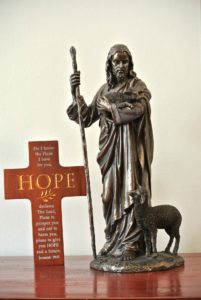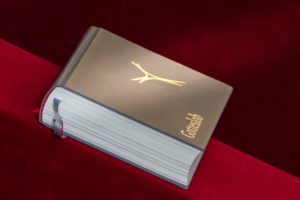There are many great healing scriptures. Sometimes, however, you run across one that you have not seen before. Or if you have seen it, God simply has not yet quickened it (made it come alive) for you. Then he quickens it for you and you see complete new revelations in it that you have never seen before. Isaiah reveals one of these hidden, healing Scriptures to us.
Isa 57:19
I create the fruit of the lips; Peace, peace to him that is far off, and to him that is near, saith the LORD; and I will heal him. (KJV)
Who is the person who is afar off? Who is the person who is near? To answer the above question, we must understand the same identical words, terms and/or phrases that are used to describe the Abrahamic Seed Group in the Old Testament (the saved Jews) also describe the Abrahamic Seed Group in the New Testament (the saved Jews with saved Gentile Christians grafted in.)
(We call the Abrahamic Seed Group Jews in the Old Testament, but we call them Christians in the Old Testament.)
This is the same identical group of people in both Testaments. In the New, however, Gentile Christians are simply grafted into the Old Testament Group.) Because of this Gentile Christian grafting, the same words, terms and /or descriptive phrases are used to describe the same Abrahamic Seed Group in both Testaments.
One of the words, terms and/or descriptive phrases used to identify the Abrahamic Seed Group in the Old Testament was the expression near. Conversely, the Gentiles in the Old Testament were referred to as far off.
This resulted in the existence of two distinct groups of people in the Old Testament era. Saved Jews composed the first group, the near group. Unsaved Gentiles made up the second group, the far group.
Keep in mind as we progress here, that healing belongs only to the near group. It did not belong to the Gentile far group until Jesus becomes the peace between the two groups.
Also remember in our verse above, Isa 57:19, that we are watching closely just two terms: near and far. Again, the person near is the Jew in the Old Testament. The person who is far off is the Gentile in the Old Testament.
These same two terms (near and far off) are also used by Paul in the New Testament in Ephesians. But here we see Gentile Christians transferred from the far off group into the near group by grafting.
Eph 2:13-14
13 But now in Christ Jesus ye who sometimes were far off are made nigh by the blood of Christ.
14 For he is our peace, who hath made both one, and hath broken down the middle (KJV)
In other words, the blood of Christ, when accepted by Gentiles, forces an instantaneous, supernatural transfer of us Gentiles from one group to the other. We are supernaturally snatched from the far off group and supernaturally place equally into the near group!
Now during the Christian era, these two groups, the far off and the near, are merged into just one group, the near group. From Jesus’ death onward, Gentiles who receive Christ are grafted into the near group right along with the saved Jews. Furthermore, we Gentile Christians stand in this group on an equal footing with the Jews and we participate in the Abrahamic blessing of healing.
We both now make up the near group, known as the Abrahamic Seed Group and are both promised healing from the hand of God.
The point is this; God will now heal the far off person as well as the near person because we Gentile Christians are no longer far off. We Gentile Christian have been brought into the near group by grafting.
No wonder Isaiah 57:19 said above, “I will heal him.” Why not? God promised healing in the Abrahamic covenant to both Jew and Gentile. No wonder Isaiah saw this and recorded it for us.
Now you can see that Christian healing traces its roots to the Old Testament and to the Jews themselves.
Learn the terms, words, and/or descriptive phrases of the Abrahamic Seed Group in both Testaments and you will have an understanding of what belongs to you that you never had before.





